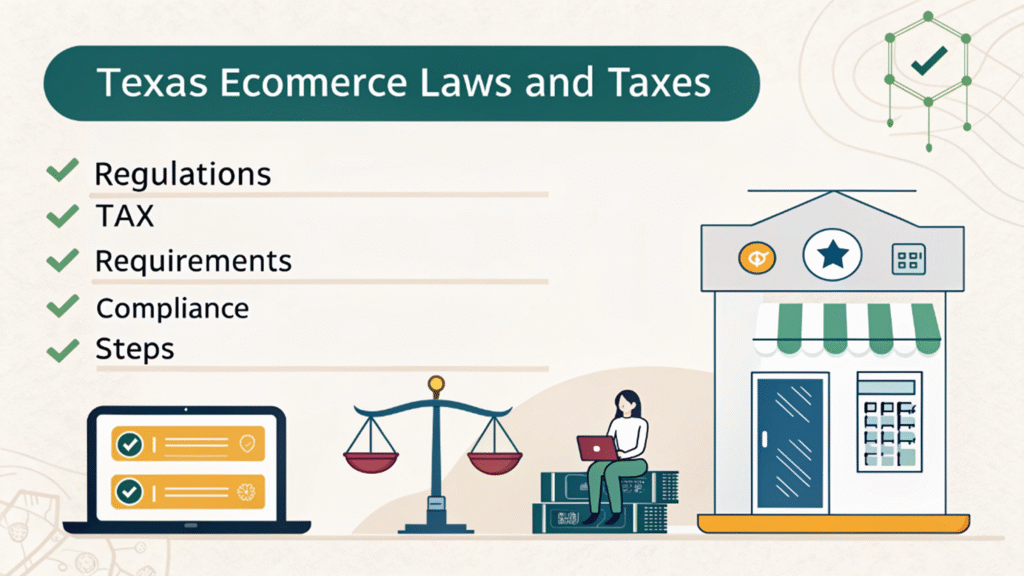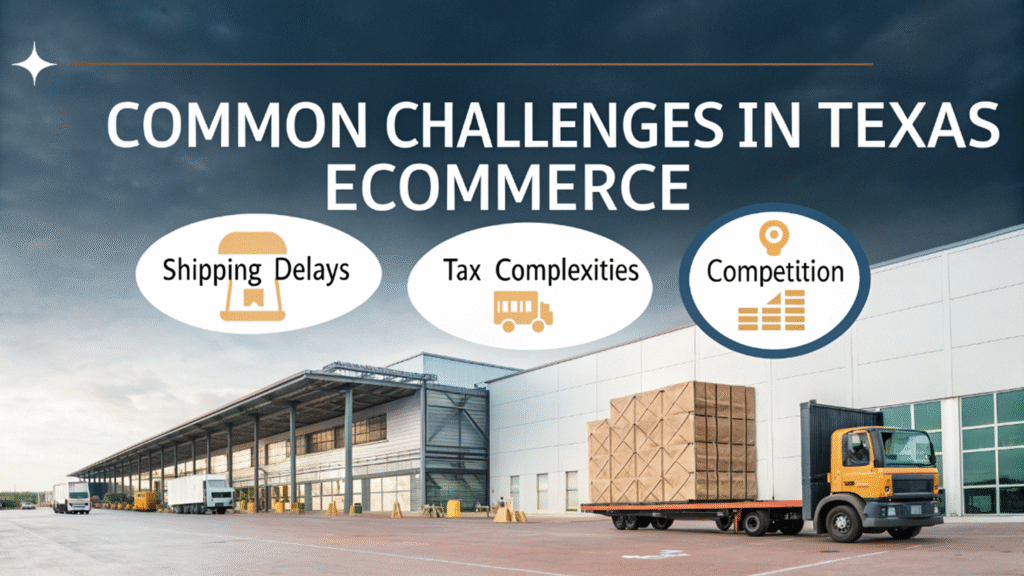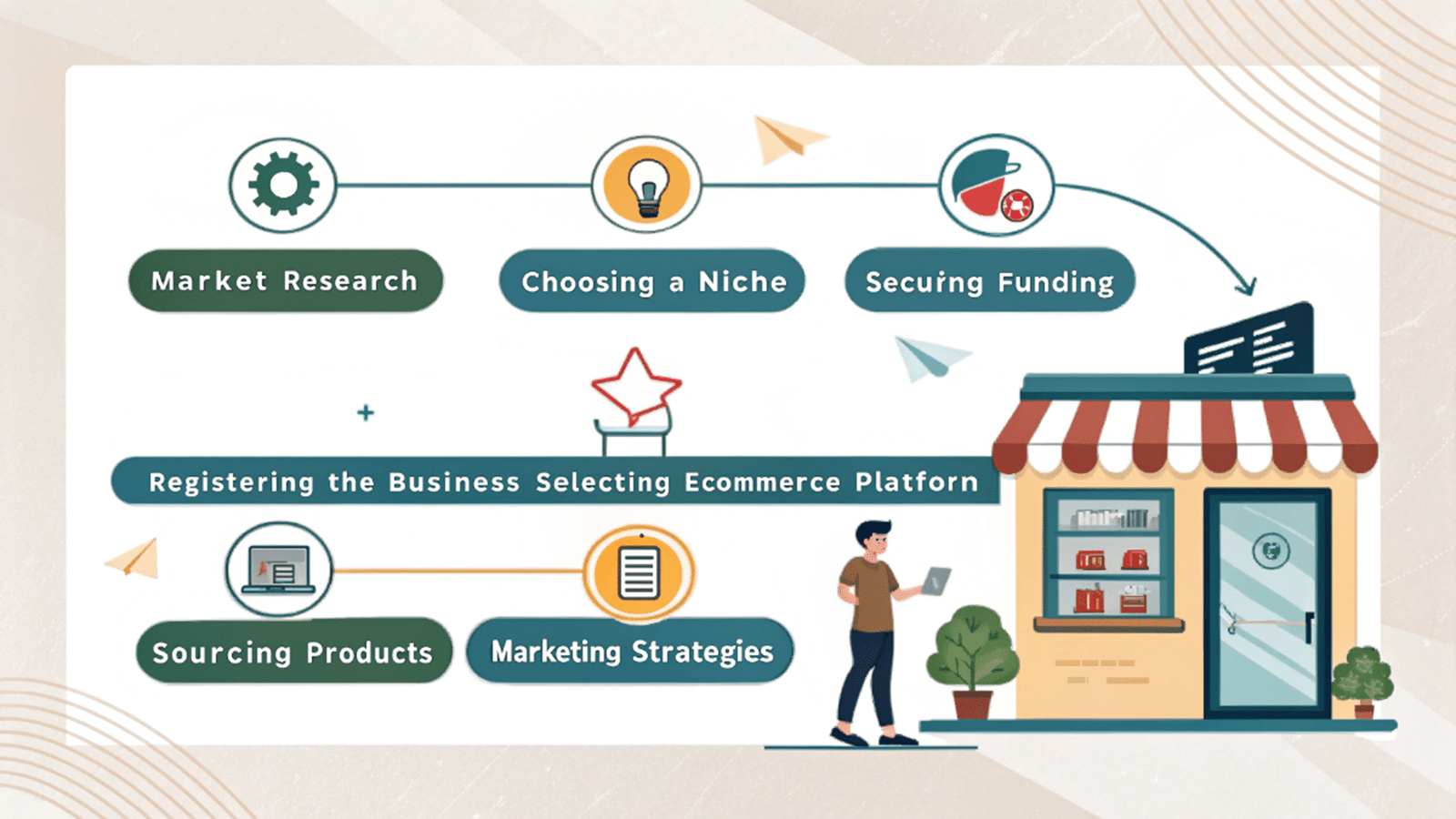Starting an ecommerce business in Texas isn’t just about creating a website and selling products it’s about building a brand that connects with one of America’s fastest-growing online markets. Texas is home to millions of active shoppers who value speed, trust, and digital convenience. The state’s business-friendly environment, zero income tax policy, and large consumer base make it a perfect place for entrepreneurs to launch and grow online ventures.
The context behind this topic goes beyond just setting up a store. Texas offers a booming economy, strong internet infrastructure, and legal structures that make online business operations smoother than most states. Whether you’re selling handmade crafts or running a large-scale dropshipping store, Texas gives you the perfect foundation to succeed. Entrepreneurs often begin their journey by performing a Texas LLC entity search to verify business names and start registration.
Understanding the Ecommerce Landscape in Texas
Texas has rapidly evolved into one of the most dynamic ecommerce markets in the United States. Cities like Austin, Dallas, and Houston are hubs for online retailers, logistics startups, and tech-driven commerce. Consumers here are used to quick delivery times, secure transactions, and wide product choices—expectations that push ecommerce brands to perform better.
The growth of the ecommerce sector in Texas is supported by both private and public initiatives. The state government encourages online business creation through simplified tax systems and fewer regulatory barriers. This makes Texas an attractive location not just for startups but for established companies looking to expand their online operations.
Why Texas Is Ideal for Ecommerce Startups
Texas gives entrepreneurs a mix of affordability, opportunity, and scalability. With no personal or corporate income tax, your profits stay where they belong in your business. This cost advantage lets you reinvest more in marketing, technology, and product expansion.
The state’s central U.S. location also plays a big role. It provides convenient access to both coasts, making shipping and fulfillment easier and faster. Combined with Texas’s world-class road and port systems, it’s no wonder that many ecommerce giants use Texas as their fulfillment and logistics base.
Choose the Right Business Structure
Choosing the correct business structure is one of the most important steps before launching your ecommerce brand. Texas offers several legal structures like Sole Proprietorships, LLCs, and Corporations, but most small business owners prefer an LLC.
An LLC (Limited Liability Company) protects your personal assets from business debts and liabilities. It also gives you tax flexibility and professional credibility. When you operate under an LLC, you can easily open business bank accounts, obtain permits, and form contracts with suppliers and marketplaces.
Register Your Business in Texas
Once you choose a structure, it’s time to make it official by registering with the Texas Secretary of State. You’ll file a Certificate of Formation (Form 205) if forming an LLC and pay the $300 filing fee. This step ensures your business name and operations are legally recognized in Texas.
You must also appoint a Registered Agent a person or service responsible for receiving legal and tax-related documents on behalf of your business. Registration can be done online using the SOSDirect portal, which makes the entire process efficient and fast.
Get an Employer Identification Number (EIN)
Your EIN (Employer Identification Number) is essential for tax filing, banking, and hiring. Think of it as your business’s unique Social Security number. You can easily apply for an EIN on the IRS website for free, and it’s usually approved instantly.
Even if you’re a solo entrepreneur, having an EIN builds trust with vendors, banks, and ecommerce platforms like Amazon or Shopify. It’s also mandatory for collecting and reporting taxes, so applying for one should be one of your first steps after registration.
Obtain a Texas Sales Tax Permit
In Texas, you can’t sell taxable goods without a Sales Tax Permit from the Texas Comptroller of Public Accounts. This license allows you to collect and remit sales tax from customers legally. Applying for it is free and can be done online through the Comptroller’s eSystems portal.
Remember to maintain accurate records of every sale and payment. Texas has strict reporting requirements, and failure to comply can result in penalties. Timely filing of your sales tax reports helps maintain your business’s good standing and reputation.
Build Your Ecommerce Website
Your website is the heart of your online business it’s your store, brand, and first impression all in one. Platforms like Shopify, WooCommerce, Wix, and BigCommerce make it easy for Texas entrepreneurs to build a professional store without needing deep coding knowledge.
Focus on creating a visually appealing design, mobile responsiveness, and easy navigation. Your product descriptions should be clear, engaging, and SEO-optimized. Use secure payment gateways like Stripe or PayPal to protect your customers’ data and build trust in your store.
Develop a Strong Brand Identity
In the crowded ecommerce world, branding is your biggest differentiator. Your brand identity includes your logo, tone, color scheme, and customer experience. It’s what makes people remember and trust you over competitors.
Start by defining what your brand stands for your values, mission, and personality. Then, maintain consistency across all your marketing channels, from your website to your social media. The stronger your brand identity, the easier it is to build loyal customers.
Source Your Products or Services
What you sell determines who you attract. Some ecommerce entrepreneurs create their own products, while others use dropshipping or wholesale models. Texas’s business ecosystem supports both local manufacturers and international importers, giving you flexibility in choosing suppliers.
If you plan to use dropshipping, work with reliable vendors to ensure consistent product quality and shipping times. For handmade or custom products, focus on unique features and storytelling to appeal to Texas’s diverse market.
Set Up Business Banking and Accounting
Separating your personal and business finances is essential. Open a business checking account under your registered LLC name to simplify tax filing and bookkeeping. Many Texas banks offer specialized business accounts for small and online retailers.
You should also consider using accounting tools like QuickBooks or Wave to track expenses, income, and invoices. Keeping your finances organized not only helps during tax season but also improves your ability to secure funding in the future.
Create a Marketing Strategy
No ecommerce business can thrive without effective marketing. Texas consumers respond well to localized campaigns that reflect their community spirit. Use SEO, content marketing, email campaigns, and paid ads to drive traffic to your store.
Social media plays a big role in ecommerce visibility. Platforms like Facebook, Instagram, and TikTok are ideal for reaching potential customers with engaging visuals and promotions. Remember consistent posting, storytelling, and interaction build long-term brand trust.
Understand Texas Ecommerce Laws and Taxes
Texas requires ecommerce businesses to follow specific rules related to sales tax, consumer privacy, and online advertising. If your annual revenue exceeds certain thresholds, you must collect sales tax from customers inside the state.

Keep yourself updated with the Texas Comptroller’s guidelines to ensure compliance. Understanding laws around return policies, digital advertising, and customer data protection is vital to running a trustworthy online business.
Manage Shipping and Logistics
Fast and affordable delivery is what customers expect. Texas’s strong logistics infrastructure gives you a huge advantage. With major ports and a central location, you can easily manage shipping across the U.S.
Partner with reputable carriers like UPS, FedEx, or USPS. Offer customers multiple shipping options and real-time tracking. Remember, a good fulfillment strategy isn’t just about delivery it’s about creating a smooth post-purchase experience that leads to repeat buyers.
Scale Your Ecommerce Business
Once your store is up and running, focus on growth strategies. Analyze customer data, track performance through analytics tools, and reinvest in marketing that delivers results. Scaling could mean expanding your product line, targeting new markets, or automating operations.
Texas provides resources like business incubators, grants, and mentorship programs that can help ecommerce owners grow sustainably. The state’s pro-business climate ensures you have every tool needed to scale profitably.
Common Challenges in Texas Ecommerce
Even with all the advantages, Texas ecommerce businesses face challenges like managing inventory, handling returns, and competing with national brands. High customer expectations for delivery and pricing can pressure small stores.

However, these challenges can be managed through technology and strong partnerships. Using data analytics, outsourcing logistics, and improving customer service are key ways to stay competitive in the Texas ecommerce space.
Final Thoughts
Starting an ecommerce business in Texas is more than just a financial opportunity, it’s a chance to be part of a thriving digital movement. With the right plan, understanding the Texas LLC cost, structure, and marketing strategy, your business can grow rapidly in this supportive state.
From registration to branding, every step matters. If you invest time in understanding the process and using tools like the Texas LLC entity search for verification and compliance, you’ll set your online business up for long-term success.
FAQs
What is the first step to starting an ecommerce business in Texas?
The first step is to choose your business structure most entrepreneurs prefer forming an LLC for legal protection. Once you’ve chosen, register your business with the Texas Secretary of State to make it official.
How much does it cost to start an ecommerce business in Texas?
The startup cost depends on your business type. Typically, registering an LLC costs $300, while additional expenses like website setup, branding, and marketing can vary based on your scale and goals.
Do I need a license to sell online in Texas?
Yes. You need a Texas Sales Tax Permit from the Texas Comptroller to sell taxable goods or services. This ensures you can legally collect and remit sales tax from customers.
How do I register my business name in Texas?
You can register your business name through the Texas Secretary of State using the SOSDirect portal. Before that, perform a Texas LLC entity search to ensure your chosen name is available.
Can I run an ecommerce business from home in Texas?
Absolutely. Texas allows home-based ecommerce operations as long as you follow zoning rules and acquire necessary local permits. Many successful online stores began as home-based businesses.
What taxes apply to ecommerce businesses in Texas?
While Texas doesn’t charge state income tax, businesses must collect and remit sales tax on taxable goods. Keeping accurate records and filing reports with the Comptroller is mandatory.
How long does it take to start an ecommerce business in Texas?
If all paperwork is ready, forming an LLC and obtaining permits can take about 5–10 business days. Building your website and marketing strategy might take a few more weeks.
What platform is best for Texas ecommerce businesses?
Shopify, WooCommerce, and BigCommerce are great options. They offer scalability, Texas-friendly tax settings, and integrations with shipping carriers. Choose based on your technical comfort and budget.
How do I handle sales tax for out-of-state customers?
If your ecommerce store sells outside Texas, you must collect taxes based on the customer’s location if your sales exceed economic nexus thresholds in that state. Use automated tax software for accuracy.
Is Texas good for ecommerce growth in 2025?
Yes. Texas continues to be one of the top states for ecommerce growth due to its low taxes, expanding digital economy, and supportive infrastructure. The outlook for 2025 and beyond is extremely positive.
